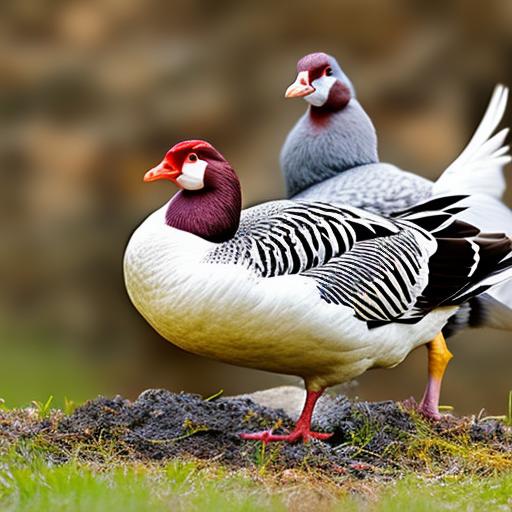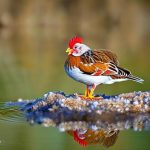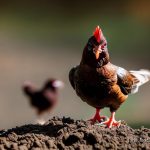Keeping geese and chickens together can be a rewarding and beneficial experience for poultry enthusiasts. While geese and chickens have different characteristics and requirements, they can coexist in a mixed flock with proper planning and management. As someone who has personally kept geese and chickens together, I can attest to the advantages of this arrangement. In this article, we will explore the benefits of raising geese and chickens together, the differences between these two species, housing requirements, feeding considerations, health considerations, behavior dynamics, potential problems to watch out for, and tips for successful integration.
Key Takeaways
- Keeping geese and chickens together is possible and can have benefits.
- Geese and chickens have different behaviors and housing requirements.
- Feeding geese and chickens together requires careful consideration.
- Health and potential problems should be monitored when keeping them together.
- Successful integration can be achieved with proper planning and management.
Benefits of raising geese and chickens together
One of the main benefits of keeping geese and chickens together is increased security against predators. Geese are known for their excellent guard instincts and can help protect the entire flock from potential threats. Their loud honking and aggressive behavior towards predators can deter them from approaching the coop or run. Chickens, on the other hand, have a natural instinct to seek shelter when they sense danger. By combining these two species, you create a more secure environment for your poultry.
Another advantage of raising geese and chickens together is improved soil health. Geese are grazers and enjoy eating grasses and weeds. They have a knack for keeping the grass short and fertilizing it with their droppings. This helps to naturally control weeds and pests while also enriching the soil with nutrients. Chickens also contribute to soil health by scratching and pecking at the ground, which helps to aerate it and control insects. The combination of geese and chickens in a mixed flock can lead to healthier soil for gardening or pasture management.
Furthermore, keeping geese and chickens together can result in more diverse egg production. Geese typically lay fewer eggs compared to chickens, but their eggs are larger and have a unique flavor profile. By having both geese and chickens in your flock, you can enjoy a variety of egg sizes and flavors. This can be particularly appealing for those who appreciate the culinary aspects of poultry keeping.
Differences between geese and chickens
Geese and chickens have distinct physical, behavioral, and nutritional differences. Understanding these differences is crucial for successfully keeping them together.
In terms of physical differences, geese are larger and more robust than chickens. They have long necks, webbed feet, and a strong beak. Chickens, on the other hand, have a smaller size, shorter necks, and non-webbed feet. These physical differences can impact their interactions within the flock and their ability to access certain areas.
Behaviorally, geese are known for their protective instincts and can be more aggressive than chickens. They are territorial animals and will defend their space and flock members against perceived threats. Chickens, on the other hand, tend to be more social and less aggressive. They establish a pecking order within the flock but are generally less confrontational compared to geese.
Nutritionally, geese have different dietary requirements compared to chickens. Geese are grazers and enjoy eating grasses, weeds, and aquatic plants. They also require a higher protein content in their diet compared to chickens. Chickens, on the other hand, are omnivores and require a balanced diet that includes grains, insects, vegetables, and supplemental calcium for egg production.
Housing requirements for geese and chickens
When keeping geese and chickens together, it is important to provide appropriate housing that meets the needs of both species.
The coop and run design should take into consideration the size difference between geese and chickens. Geese require more space due to their larger size and need for grazing areas. The coop should have enough room for all birds to comfortably roost at night, with separate nesting boxes for each species. The run should be spacious enough to allow geese to graze and chickens to scratch and peck at the ground.
Space requirements are also important to consider. Geese require more space per bird compared to chickens. A general guideline is to provide at least 10 square feet of space per goose and 4 square feet per chicken in the coop. In the run, provide at least 20 square feet per goose and 10 square feet per chicken. These space requirements ensure that each bird has enough room to move around and engage in natural behaviors.
Nesting boxes and roosts should be provided for both geese and chickens. Geese prefer to nest on the ground, so providing a low, secluded area with straw or grass can accommodate their nesting needs. Chickens, on the other hand, prefer elevated nesting boxes with bedding material such as straw or wood shavings. Roosts should be provided at different heights to accommodate the different sizes of geese and chickens.
Feeding geese and chickens together
Feeding geese and chickens together requires careful consideration of their dietary needs and preferences.
Both geese and chickens can be fed a commercial poultry feed that is appropriate for their species. However, geese require a higher protein content in their diet compared to chickens. A feed with a protein content of around 18-20% is suitable for geese, while a feed with a protein content of around 16-18% is suitable for chickens. It is important to choose a feed that meets the nutritional requirements of both species.
Supplemental feeding may be necessary for geese, especially during certain stages of their life cycle. Goslings require a higher protein content in their diet compared to adult geese. Feeding them a higher protein starter feed can ensure proper growth and development. Additionally, during the breeding season, geese may benefit from supplemental calcium in the form of crushed oyster shells or grit to support eggshell formation.
Water requirements are also important to consider when feeding geese and chickens together. Both species require access to clean, fresh water at all times. Geese enjoy swimming and should have access to a shallow pool or pond for bathing. Chickens, on the other hand, do not require swimming water but should have access to a water source that is deep enough for them to drink from.
Health considerations when keeping geese and chickens together

Keeping geese and chickens together can present certain health considerations. It is important to be aware of common health issues for both species and take preventative measures to ensure their well-being.
Common health issues for geese include respiratory infections, parasites, and foot problems. Respiratory infections can be caused by poor ventilation or exposure to damp conditions. Regular cleaning of the coop and providing adequate ventilation can help prevent respiratory issues. Parasites such as mites and worms can also affect geese. Regular deworming and monitoring for signs of infestation can help keep parasites under control. Foot problems, such as bumblefoot, can occur in geese that are kept on hard or rough surfaces. Providing soft bedding material in the coop and run can help prevent foot problems.
For chickens, common health issues include respiratory infections, parasites, and egg-related problems. Similar preventative measures should be taken for chickens as for geese in terms of ventilation, cleanliness, deworming, and monitoring for signs of illness or infestation. Egg-related problems can include egg binding or soft-shelled eggs. Providing a balanced diet with supplemental calcium can help prevent these issues.
Treatment options for health issues in geese and chickens may vary depending on the specific condition. It is important to consult with a veterinarian who specializes in poultry health for proper diagnosis and treatment recommendations.
Behavior of geese and chickens in a mixed flock
The behavior of geese and chickens in a mixed flock can be fascinating to observe. Understanding the dynamics of their interactions can help create a harmonious environment for all birds.
Pecking order dynamics are a natural part of flock behavior for both geese and chickens. Establishing a pecking order helps to maintain social order within the flock. Geese tend to be more dominant and may assert their authority over chickens. However, chickens are generally more adaptable and can navigate the pecking order without much conflict. It is important to provide enough space and resources to minimize aggressive behavior.
Social interactions between geese and chickens can be positive and beneficial. Geese are known for their protective instincts and will often take on a guardian role within the flock. They will alert the entire flock to potential threats and may even defend smaller birds against predators. Chickens, on the other hand, can benefit from the presence of geese as they provide an added layer of security.
A mixed flock of geese and chickens can also provide social enrichment for both species. They can engage in natural behaviors such as grazing, scratching, and dust bathing together. This can lead to a more contented and fulfilled flock overall.
Potential problems to watch out for when keeping geese and chickens together
While keeping geese and chickens together can be beneficial, there are potential problems that should be watched out for.
Aggression towards smaller birds is one potential issue when keeping geese and chickens together. Geese, being larger and more dominant, may exhibit aggressive behavior towards smaller chicken breeds or younger birds. It is important to monitor their interactions closely and provide enough space and resources to minimize aggression.
Overcrowding is another potential problem that can arise when keeping geese and chickens together. Both species require adequate space to move around and engage in natural behaviors. Overcrowding can lead to stress, aggression, and an increased risk of disease transmission. Providing enough space per bird is crucial for maintaining a healthy and harmonious flock.
Disease transmission is a concern when keeping geese and chickens together. While geese and chickens can coexist without major issues, they can still transmit diseases to each other. It is important to practice good biosecurity measures, such as regular cleaning and disinfection of the coop and run, to minimize the risk of disease transmission. Additionally, monitoring for signs of illness in both species and seeking veterinary care when necessary can help prevent the spread of diseases.
Tips for successful integration of geese and chickens
To ensure a successful integration of geese and chickens, it is important to follow these tips:
1. Gradual introduction: Introduce geese and chickens to each other gradually, allowing them to get used to each other’s presence before allowing direct contact. This can be done by placing them in separate but adjacent enclosures for a period of time.
2. Providing separate feeding areas: Geese and chickens have different feeding preferences and requirements. Providing separate feeding areas can help prevent competition and aggression over food.
3. Monitoring behavior closely: Observe the interactions between geese and chickens closely, especially during the initial stages of integration. Address any signs of aggression or stress promptly to prevent further issues.
Is it possible to keep geese and chickens together?
In conclusion, it is possible to keep geese and chickens together with proper planning and management. The benefits of raising geese and chickens together include increased security against predators, improved soil health, and more diverse egg production. However, it is important to be aware of the differences between geese and chickens in terms of their physical characteristics, behaviors, and nutritional needs. Providing appropriate housing, feeding, and healthcare is crucial for maintaining a healthy and harmonious mixed flock. With careful attention to these considerations, keeping geese and chickens together can be a rewarding experience for poultry enthusiasts.
If you’re considering keeping geese and chickens together, you may also be interested in learning about the benefits of renting a chicken coop. Renting a chicken coop can be a great option for those who want to keep chickens but don’t have the space or resources to build their own coop. It allows you to experience the joys of raising chickens without the long-term commitment. To find out more about renting a chicken coop, check out this informative article on Poultry Wizard’s website: Rent a Chicken Coop.
FAQs
What are geese and chickens?
Geese and chickens are domesticated birds that are commonly kept for their eggs, meat, and as pets.
Can geese and chickens be kept together?
Yes, geese and chickens can be kept together. However, it is important to ensure that they have enough space and resources to coexist peacefully.
What are the benefits of keeping geese and chickens together?
Keeping geese and chickens together can provide a variety of benefits, including increased security against predators, improved soil health, and reduced pest populations.
What are the potential challenges of keeping geese and chickens together?
Some potential challenges of keeping geese and chickens together include territorial behavior, competition for resources, and the risk of disease transmission.
What should be considered when keeping geese and chickens together?
When keeping geese and chickens together, it is important to consider factors such as the size of the enclosure, the availability of food and water, and the compatibility of the birds.
How can geese and chickens be housed together?
Geese and chickens can be housed together in a variety of ways, including in a shared enclosure or in separate enclosures that are connected by a shared outdoor space.
What should be fed to geese and chickens when kept together?
Geese and chickens should be fed a balanced diet that includes a mix of grains, protein, and fresh fruits and vegetables. It is important to ensure that each bird has access to enough food and water.
Meet Walter, the feathered-friend fanatic of Florida! Nestled in the sunshine state, Walter struts through life with his feathered companions, clucking his way to happiness. With a coop that’s fancier than a five-star hotel, he’s the Don Juan of the chicken world. When he’s not teaching his hens to do the cha-cha, you’ll find him in a heated debate with his prized rooster, Sir Clucks-a-Lot. Walter’s poultry passion is no yolk; he’s the sunny-side-up guy you never knew you needed in your flock of friends!







